FIGHTING FOR RECOGNITION
First global waste pickers’ trade union launched
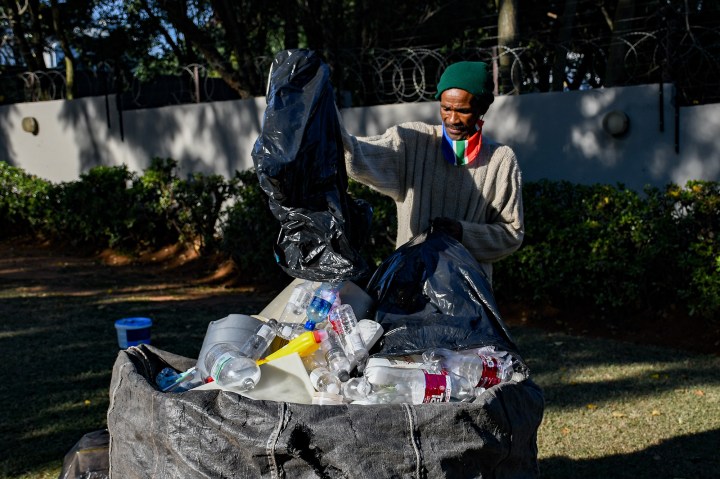
Thirty-six waste pickers’ organisations from 34 countries have been fighting for decades for the recognition of their work, their rights and impact on the environment.
Douglas Mali (48) wakes up every day at 4am to ensure he’s the first waste picker sifting through the bins that residents leave outside their houses in the upper-class suburbs of Sandton, Johannesburg.
He walks about 15km a day through the suburbs from Monday to Friday, pushing a trolley filled with plastic, paper, aluminium, glass and other materials residents have thrown away that could be recycled.
To him, this is not rubbish — it’s money.
Every Saturday, after sorting through the materials — which Mali says is the most time-consuming and energy-intensive part of his job — he and his colleague Refuoe Mokuoane from Lesotho take their trolleys to the Stratum Park scrapyard to exchange their collected recyclable materials for money.
They need 20kg of plastic to make just R80. They make about R3,000 a month, most of which is sent back to their families in the Eastern Cape and Lesotho.
Mali lives in Delta Park with four other waste pickers. He says he used to stay along the Braamfontein Spruit until the metro police came and burnt his clothes and blankets and he fled.
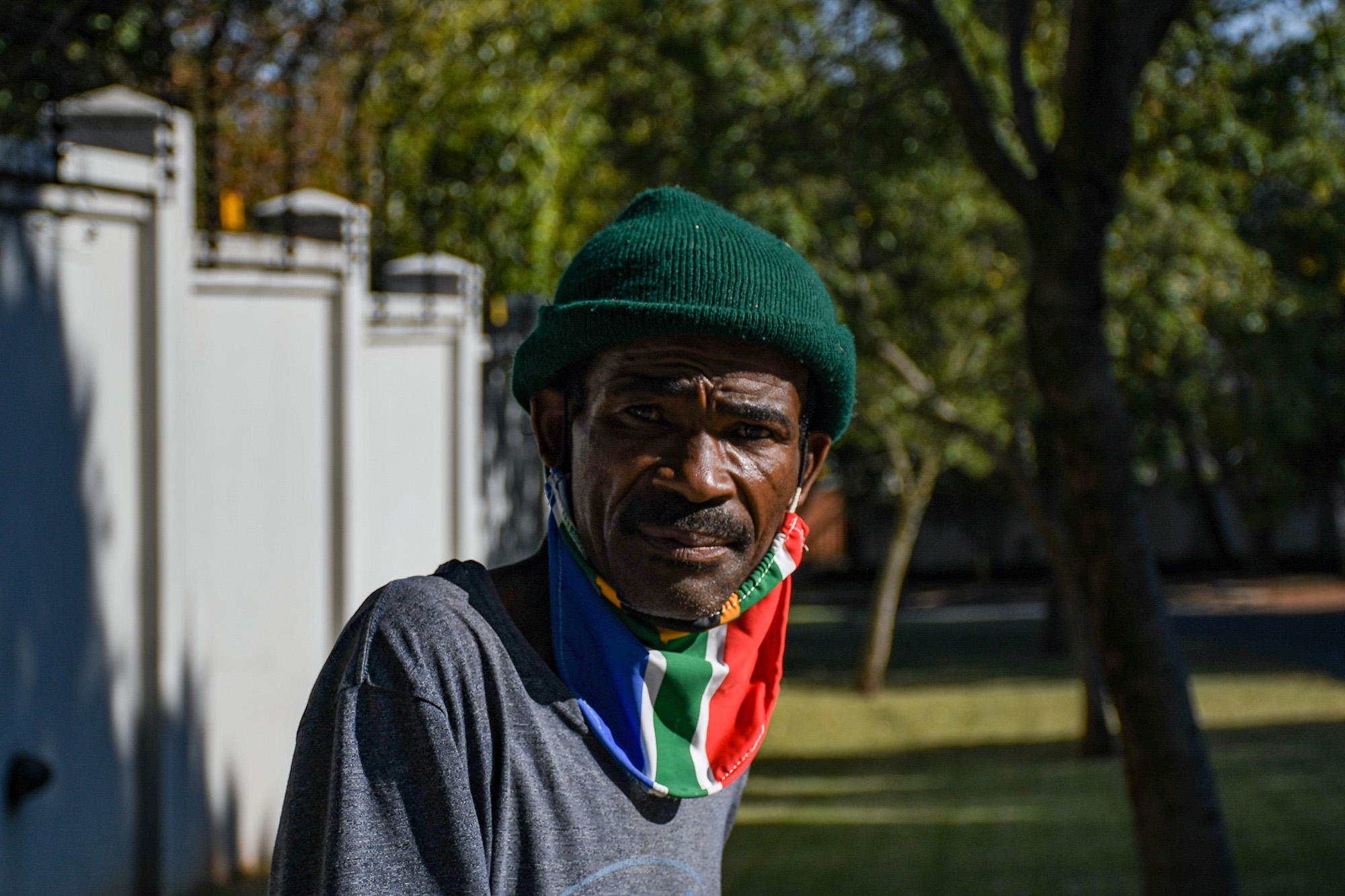
Douglas Mali, originally from the Eastern Cape, has been a waste picker for the past 10 years. (Photo: Julia Evans)
There are 60,000 to 90,000 waste pickers in South Africa and an estimated 20 million around the world.
Global alliance formed
Thirty-six waste pickers’ organisations from 34 countries have been fighting for decades for the recognition of their work, their rights and the positive impact they make on the environment. On Saturday, 29 October, the first global waste pickers’ trade union was launched: the International Alliance of Waste Pickers.
The alliance and its accompanying constitution aim to act as a representative structure and mouthpiece for waste pickers, defending waste pickers’ work and recognising their environmental contribution.
A study by the Council for Scientific and Industrial Research reports that South Africa’s waste pickers are responsible for collecting 80% to 90% of the used packaging and paper that is recycled in the country.
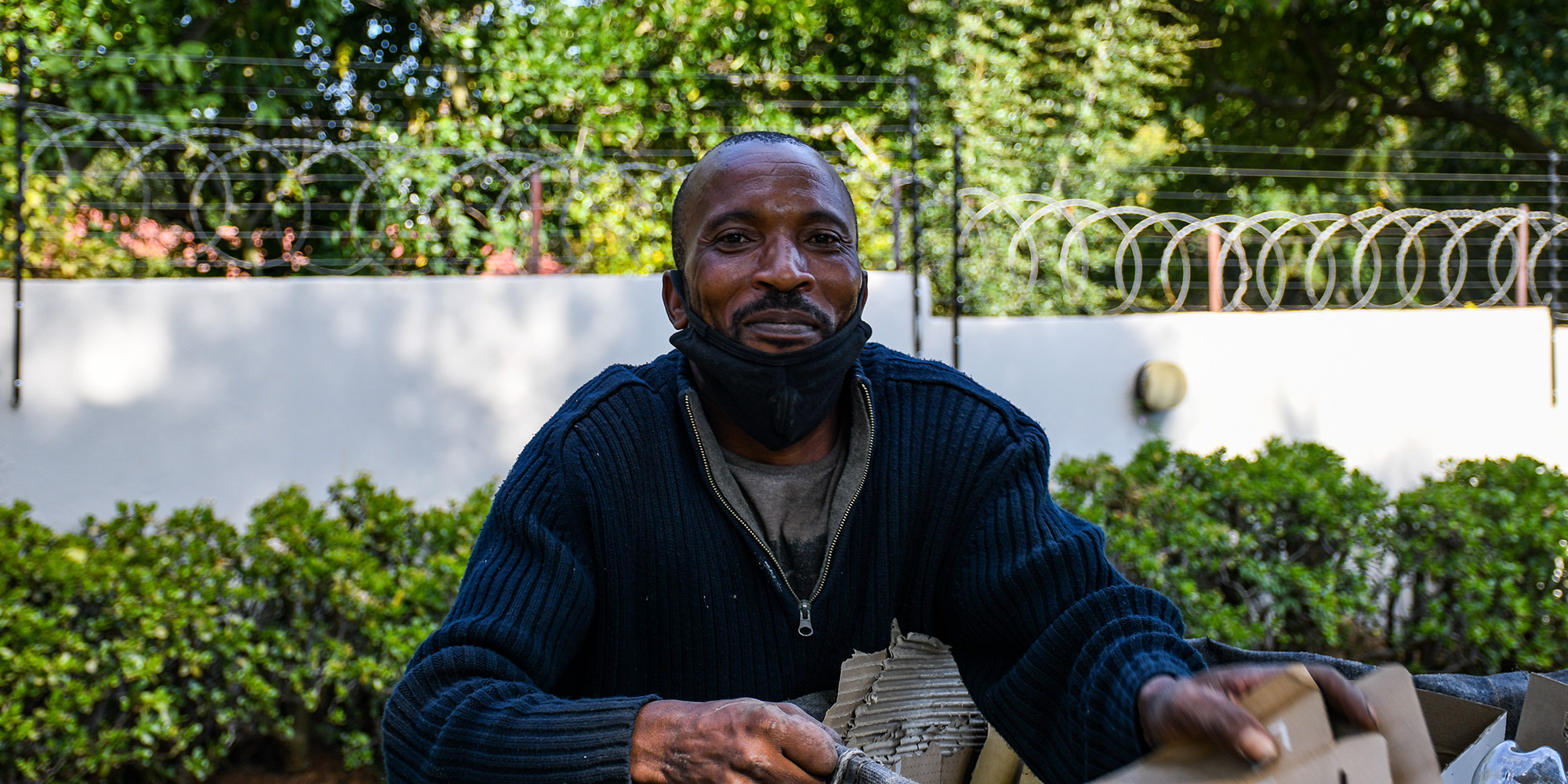
Refuoe Mokuoane left Lesotho to find work in South Africa and with no other options, became a waste picker. (Photo: Julia Evans)
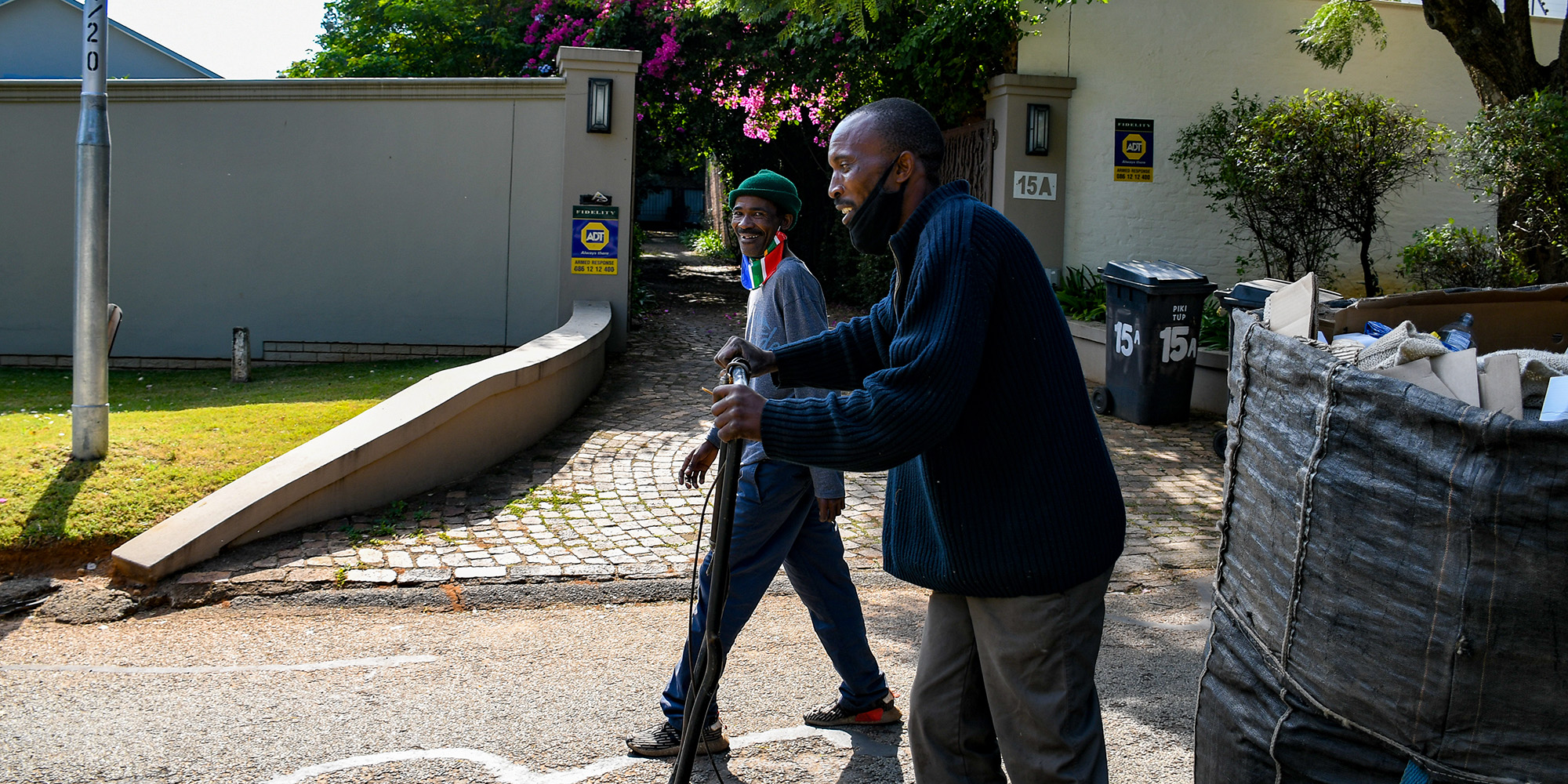
Douglas Mali (walking) works with Refuoe Mokuoane (riding on trolley), helping each other collect, sort through and transport recyclable materials which they exchange for money. (Photo: Julia Evans)
The Waste Picker Integration Guideline for South Africa, published in 2020 by the Department of Forestry, Fisheries and the Environment (DFFE) and the Department of Science and Innovation, reported that 57.1% of post-consumer paper and packaging materials in SA were recovered for recycling, putting the country on a par with many European countries, largely due to informal waste pickers who sort through materials in bins or at dumpsites.
The guideline states: “This impressive recycling rate is largely due to informal waste pickers who, in the absence of formal programmes to collect recyclables, realised that valuable materials were being buried instead of put to productive use.”
Two organisations in South Africa that represent waste pickers have become prospective affiliates of the International Alliance of Waste Pickers — the South African Waste Pickers Alliance (Sawpa) and the African Reclaimers Organisation (ARO).
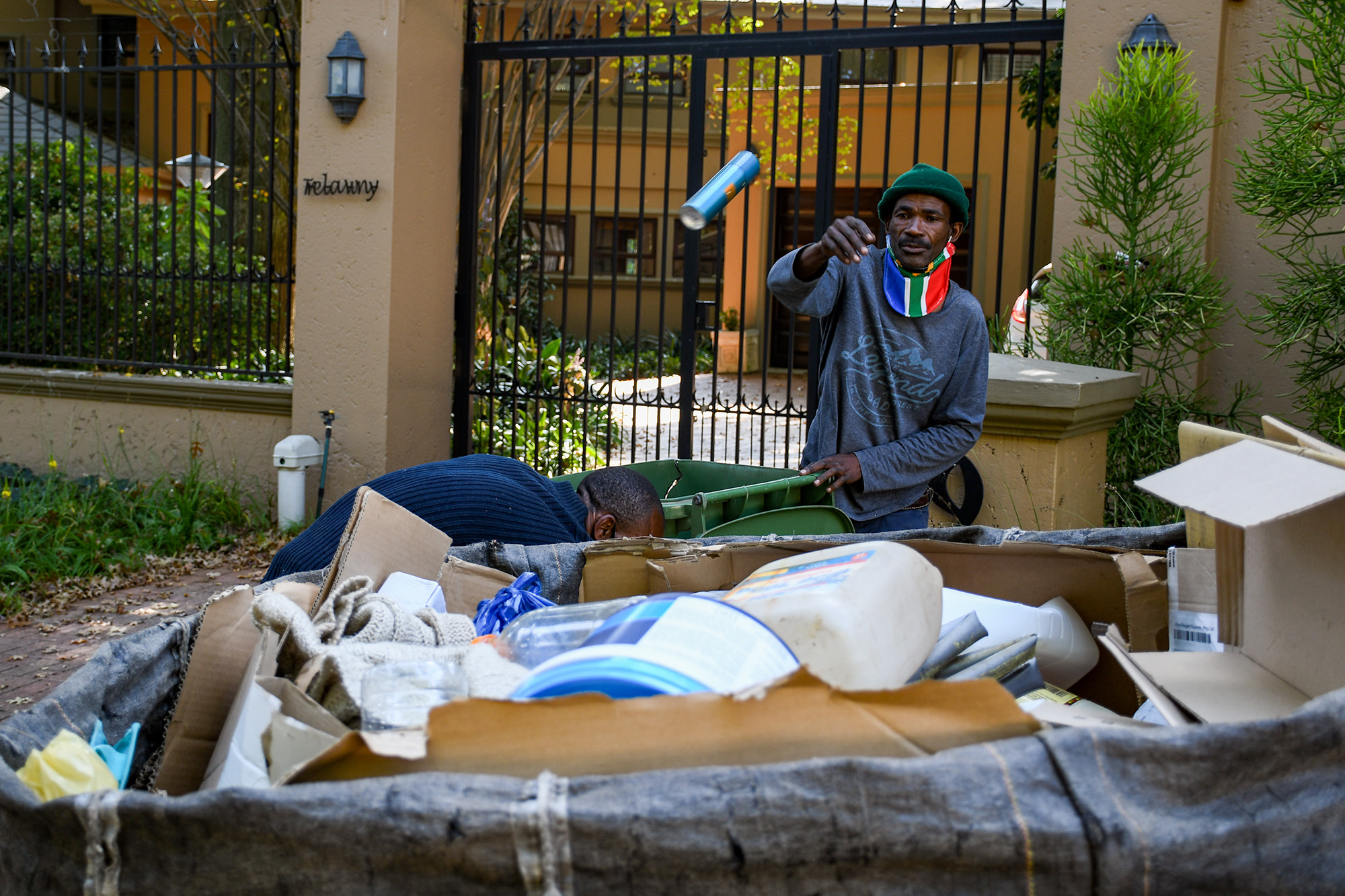
Douglas Mali and Refuoe Mokuoane sift through a Sandton resident’s bin to find recyclable materials that they can sell. (Photo: Julia Evans)
South Africa, with countries including Ghana, Democratic Republic of the Congo, Kenya, France, Brazil, Uruguay, the US and India, took part in the historic launch of the International Alliance of Waste Pickers.
The alliance has five priority action points.
The first is to defend waste pickers’ right to work and their rights as workers. The alliance said it would advocate for the recognition of waste pickers as workers who play an important role in waste management systems and deserve a fair wage that compensates them for their environmental contribution.
Community collecting centre
Godfrey Phakedi is a manager at WastePreneurs, an initiative aimed at uplifting waste pickers by providing a community collecting centre at the Pirates Club in Parkhurst, Johannesburg for waste pickers to safely store their trolleys and saving them hours of trekking to sites to sell their waste.
Phakedi said “waste is putting food on the table for some people” and waste pickers do not resort to crime nor do they have to find piece work jobs to make an income.
Phakedi says the government should be encouraged to support waste pickers by providing more recycling centres to sell waste to and providing safety “tools” like reflector vests, and flashing lights for the backs of trolleys, as waste pickers often push their trolleys on busy roads and can get hit by cars.
Jane Barrett, the director of the Organisation and Representation Programme at WIEGO (Women in Informal Employment: Globalising and Organising), which has for the past 20 years supported the organising of waste pickers in a number of countries (including SA), said most waste pickers prefer to be self-employed and to remain autonomous.
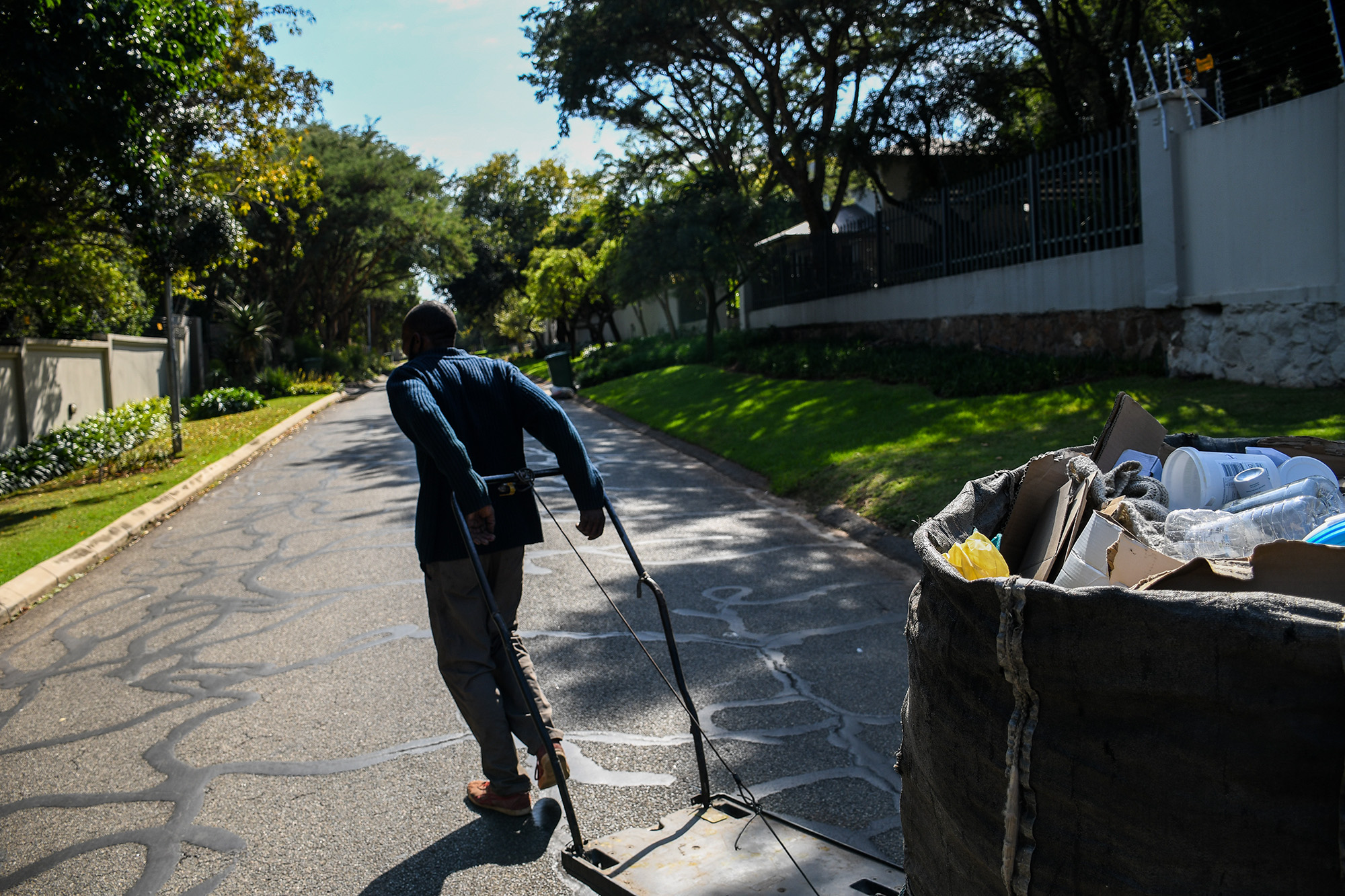
Refuoe Mokuoane pulls his trolley filled with recyclable materials to a sorting site. They pull the trolley more than 15km a day. (Photo: Julia Evans)
“The issue that waste picker organisations are pushing for is some compensation as environmental workers, but not in an employment relationship, so a payment according to the amount of waste that they collect, to supplement what they receive by selling the recyclables on the market,” explained Barrett.
Phakedi said most waste pickers who worked with his organisation made about R300 to R400 per day before Covid, but since the pandemic and the impact of rolling blackouts on the economy, things have been harder.
“There are a few organisations that have a slightly different sort of model and aspiration, who may want to ultimately be municipal workers, but by and large, the aspiration is to remain self-employed.”
The international alliance is also working to get waste pickers recognised as environmental workers who are contributing to climate change mitigation at global, national and local levels.
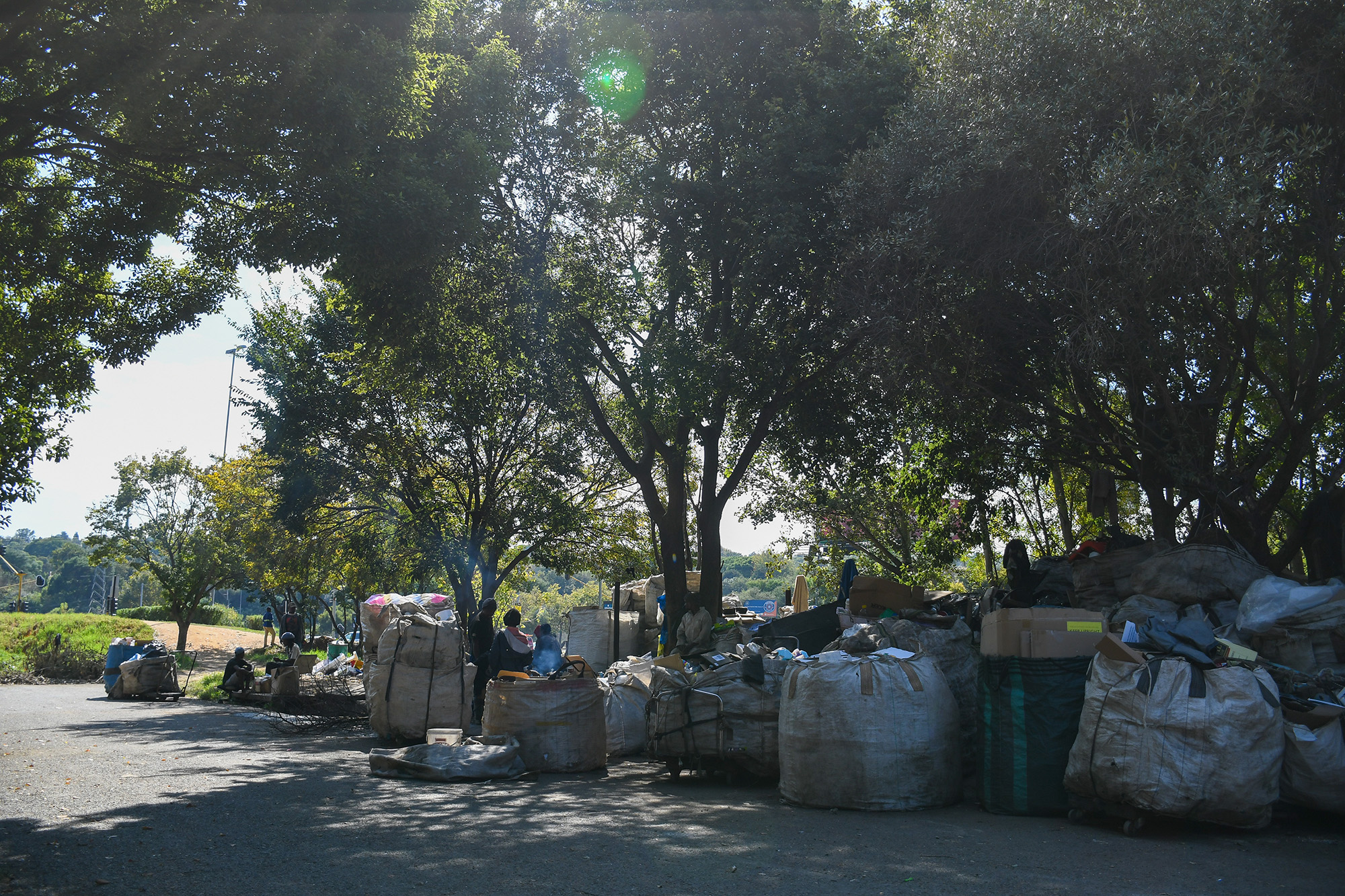
An informal sorting site and camp in Sandton where waste pickers store their trolleys filled with recyclable materials, sort materials, sleep and cook. Waste pickers have to stay with their trolleys before a truck comes to pick up materials or before they drop off their collections at a recycling site. (Photo: Julia Evans)
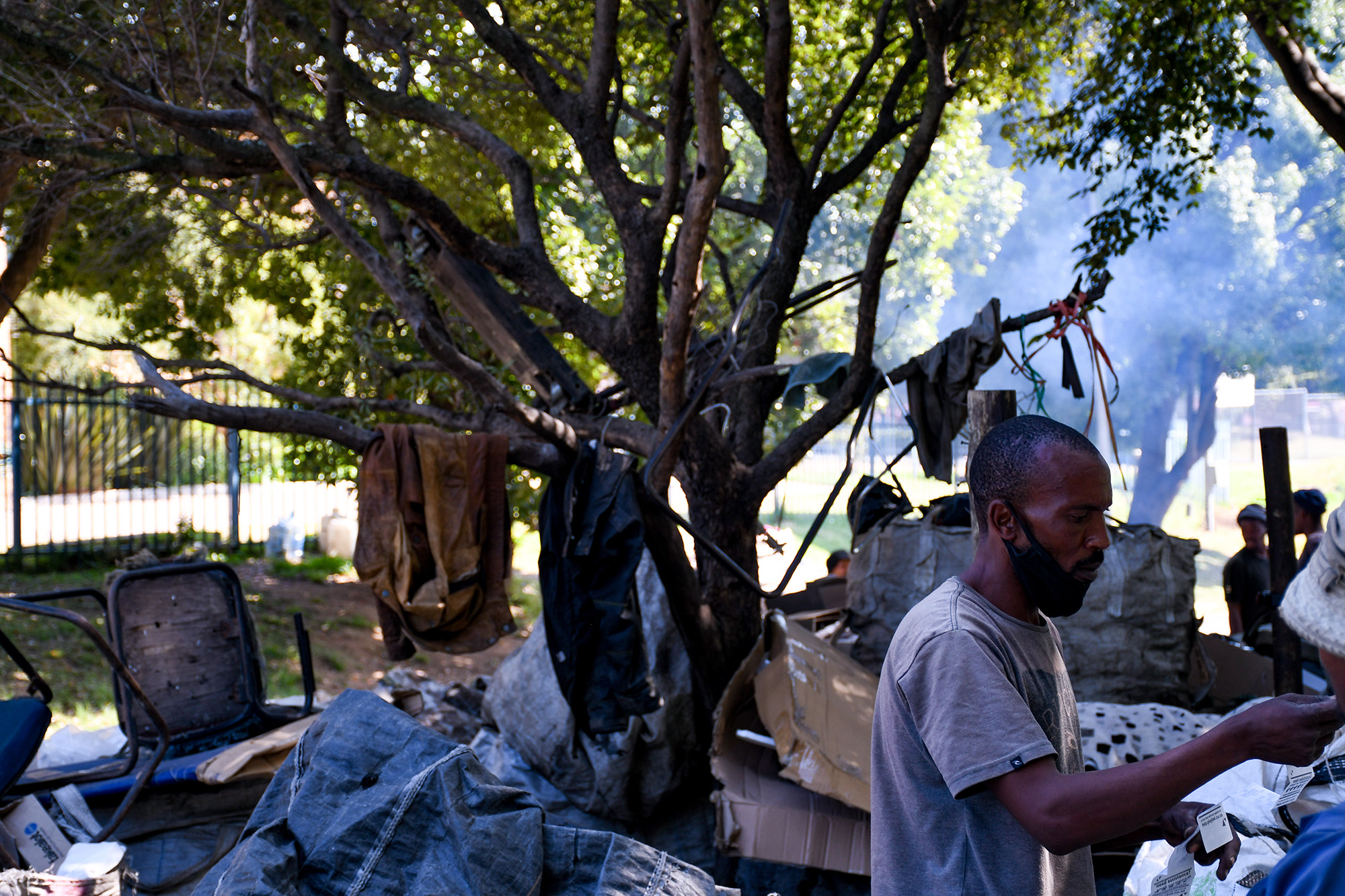
Refuoe Mokuoane sorts recyclable materials at an informal sorting site and camp in Sandton. (Photo: Julia Evans)
“Through their activities in collecting, sorting, recovering and recycling waste, waste pickers help mitigate climate change,” said the alliance. It gave the examples of waste pickers from Colombia’s Association of Waste Pickers of Bogotá who prevented the emissions of more than 407 thousand tonnes of CO2 equivalent (eCO2) in 2020 as well as India’s SWaCH Cooperative which mitigated the emissions of more than 211 tonnes of CO2.
“Taken together, the avoided emissions are equivalent to removing a total of 133,000 passenger cars from the road each year,” said the alliance, adding that it would participate in COP27 in Egypt.
Recognition and accreditation
Additionally, the alliance aims to gain recognition and accreditation as a representative international organisation of waste pickers at negotiating structures such as the International Labour Conference of the ILO, as well as advocating that extended producer responsibility (EPR) initiatives should acknowledge waste pickers’ contribution to waste management and recycling.
Barrett explained that EPR is a system to get manufacturers to take responsibility for some of the costs of the disposal and/or recycling of their products and packaging.
“The EPR regulations for packaging in SA were gazetted by government after extensive consultation with stakeholders, including the manufacturers who market their goods packaged, and the recycling industry, including organised waste pickers represented by Sawpa and ARO.”
Barrett said that in SA there had been some progress in incorporating waste picker recognition in the EPR regulations.
Visit Daily Maverick’s home page for more news, analysis and investigations
“Waste pickers are currently registering for the purposes of that recognition and, ultimately, compensation as waste pickers and for their environmental contribution.”
However, she said: “There is still quite a long way to go in terms of the formal recognition of waste pickers and their organisations at the local government level. For example, to negotiate around access to infrastructure, support for sorting spaces, engagement around housing, etc.”
The alliance also aims to end plastic pollution, highlighting that, “every minute, the equivalent of one garbage truck of plastic is dumped into the ocean, endangering aquatic life, threatening human health and resulting in myriad hidden costs for the economy”.
In terms of how waste pickers will play a role in ending plastic pollution, the alliance is pushing for EPR regulations to recognise that “waste recovery generates a large number of livelihoods, and contributes to the incomes of millions of individuals.
“Also, governments across the world should recognise waste pickers’ contributions to resource recovery, conservation and transforming recyclables; and stop the systemic repression of their work and lives, ultimately jeopardising recycling rates and the mitigation of climate change and marine plastic pollution,” said the alliance. DM/OBP



















 Become an Insider
Become an Insider
Comments - Please login in order to comment.